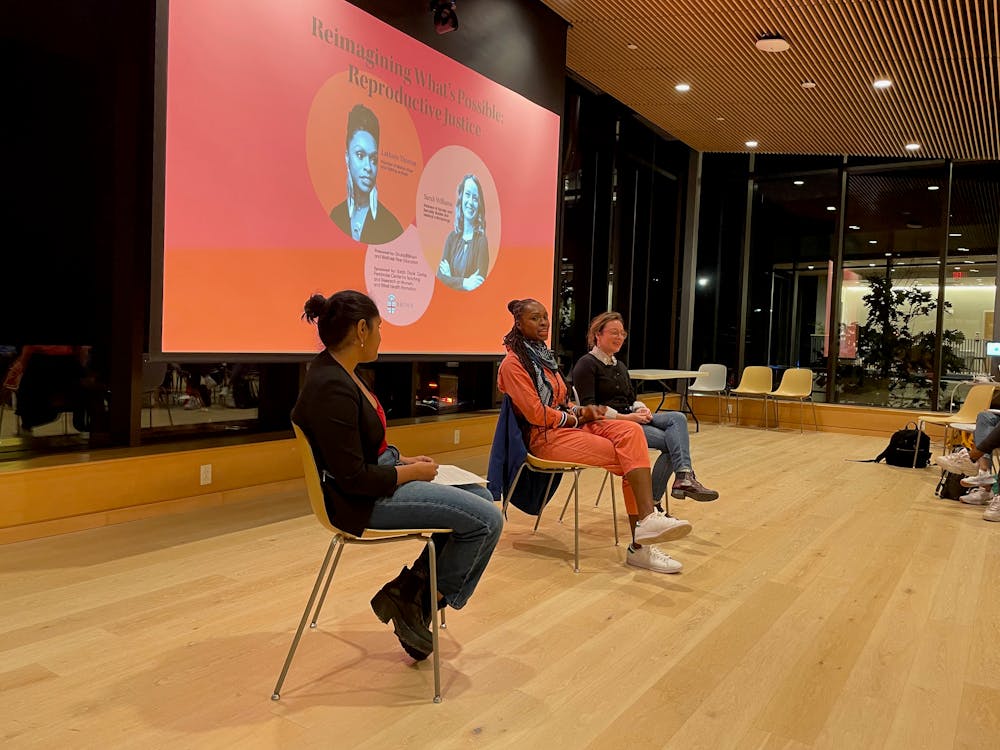Latham Thomas, founder of maternity lifestyle brand Mama Glow, and Sarah Williams, visiting assistant professor of anthropology and gender studies, discussed their journeys with reproductive justice in a conversation hosted by Doulas@Brown in the Multipurpose Room of the Health & Wellness Center Friday. At the event, entitled “Reproductive Justice: Reimagining What’s Possible,” the speakers discussed birth equity, knowledge transfer and a doula class slated to be hosted on campus this spring.
Doulas@Brown is a “BIPOC-centered reproductive justice doula collective that provides birth and postpartum support to the Providence community and engages in activism and education on Brown’s campus,” according to a flyer distributed during the event.
The flyer defines a doula as a “person who provides emotional and physical support to you during major life transitions.” There are different types of doulas, but the flyer focused on birth and postpartum doulas, who provide support during and after birth.
Thomas noted that Mama Glow — which has an ongoing partnership with Doulas@Brown — trains a community of doulas, helping them find work, develop professionally and forge mentorships. The company also works to support families by matching them with doulas.
Leona Hariharan ’23, the president of Doulas@Brown and the event’s organizer, said that she became involved with the doula community through her supervisor Tanya Purdy, director of BWell Health Promotion. Hariharan added that she began taking a doula class taught by Mama Glow during a particularly challenging time in her life, and “it was honestly just such a great space.”
Hariharan said that the class helped her realize she could “create healing experiences for other people.” She then approached Thomas about introducing her peers on campus to doula work, and Thomas sponsored scholarships for five students to enroll in doula training courses.
According to her introduction at the event, Williams has studied and worked with doula and midwife communities in Texas, Canada and the Yucatán Peninsula, and taught a course called GNSS 1510A: “Reproductive In/Justice” in the fall 2021 semester.
At the event, Thomas and Williams spoke about their life paths and how they became involved with reproductive justice. Both said that they felt they are on course to pursue their life’s callings, having demonstrated interest in the birth process from a young age.
Thomas and Williams also described their definitions of “reproductive justice,” which Williams said includes “the right to have a child or to not have a child, and the right to parent your children with dignity and safety.”
Reproductive justice also includes “embracing and creating partnerships with communities” and “unlocking knowledge and making it accessible,” Thomas said.
“I think a lot about knowledge transfer,” she added, “and how we push aside people like our elders and others who have so much wisdom.”
Thomas and Williams discussed both historical and contemporary reproductive issues, including high Black maternal mortality rates in the United States, the disconnect between academia and local communities and the extractive nature of anthropological studies.
They also spoke about current flaws in OB/GYN undergraduate education, medical school training and post-graduate education. “The system is not built for those it is for,” Williams said.
Williams focused on the lack of diversity among medical professionals and the lack of exposure they have to the practices of midwives and doulas. “They very rarely see non-violent birth,” she said, adding that OB/GYNs should be required to do rotations with midwives when training.
When most people go to the hospital to give birth, “we get into this framework that is grounded in efficiency and urgency,” Thomas said.
“You’re on a time frame,” she added. “It’s a business … and you are delivering in captivity, in a place not designed for your safety and dignity and sense of belonging and community.”
Thomas also discussed ways that the medical system, through “racist propaganda,” has closed off intergenerational knowledge systems within certain cultures. “Think about stories we carry and information we get from our family … we have to defend a pathway of knowledge we shouldn’t have to fight for,” she said.
“Our goal is to not scare you away from medicine,” Hariharan said to the students attending the event. “I would like to say it’s an invitation … the time before medical school is the time when we should learn to care for people.”
At the end of the event, Thomas and Williams announced that they will be teaching a class that will be called “Theorizing Reproductive In/Justice” together in the spring semester, which will be cross-listed in gender and sexuality studies and anthropology. Students who complete the class will receive birth doula certification, they said.
The motivation for this course largely comes from student interest, Williams explained. While teaching her course on reproductive justice, she was approached by students who wanted to know how they could become doulas.
Thomas will teach the lab portion of the class, while Williams will teach the seminar portion. The course will have 20 seats reserved for Brown students and five seats reserved for members of the Providence community.
According to Williams, “universities have so much going on” that events like the Friday discussion that are “student-organized and student-run expose people to opportunities they might not have come across” otherwise, she said.
“I think students on campus are creating a pathway for the future of what education can look like,” Thomas said. “What I have seen from Brown students is that there's tenacity and a sense of vision around not only what's possible, but what they would like to create while they're still here.”
“I think it's important for us as community members and organizations to … empower students with resources,” she added.
Junnie Kim ’26, who attended the event, has been interested in reproductive justice for a long time, and found the discussion engaging. “It was super fun,” she said. “I could hear (the speakers) talk for days.”
Regarding the reproductive justice class slated for spring 2023, Kim added that she is already “in the queue for the class.”





